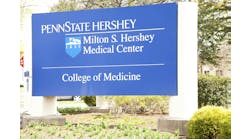VCU Health’s Sprint Towards Health Equity: A Conversation with Dr. Marcelle Davis
At the end of 2021, the senior leaders of the academic medical center-based VCU Health, based in Richmond, Virginia, which has 92 locations across central Virginia, made the announcement that they were promoting Dr. Marcelle W. Davis from her initial role as the health system’s first director of diversity, equity and inclusion (DEI), to vice president of diversity, equity and inclusion, after one year in the director role.
As the Dec. 14 press release announcing the appointment stated, “VCU Health System today named Dr. Marcelle W. Davis as the inaugural vice president of diversity, equity and inclusion (DEI) for VCU Health System. For the past year, Dr. Davis served as the health system’s first director of DEI, leading the groundwork to integrate inclusion into the fabric of VCU Health. Under her leadership, VCU Health was selected as a Ragan 2021 Corporate Social Responsibility and Diversity Award recipient for diversity, equity and inclusion resources on VCU Health's intranet. In her new role, Dr. Davis will lead the development of an integrated DEI and cultural humility strategy across the health system that will benefit patient care and experience.”
“Through Dr. Davis’ vision and direction, we will continue to transform our workplace diversity and inclusion programs and by doing so, enhance our recruitment and retention of talented team members from diverse and underrepresented groups,” said Art Kellermann, M.D., senior vice president for health sciences at Virginia Commonwealth University and CEO of VCU Health System, said in a statement. “This will not only improve our ability to educate, train and inspire team members at all levels of our organization, it will make us a better, stronger and more caring place to work.”
The press release went on to note that “Dr. Davis came to VCU Health in 2020 from Booz Allen Hamilton in McLean, Va., where she served as leader of diversity, equity and inclusion, and led the firm in a diversity and inclusion, engagement and integration strategy for succession and talent planning. Dr. Davis was also responsible for strategic planning and operational management of 77 employee affinity groups, development and delivery of training and resources, and much more. Prior to joining Booz Allen Hamilton, Dr. Davis held leadership positions in DEI at the Federal Reserve Bank of Richmond, Ryder System Inc. and Holland & Knight, LLP.”
“I am honored to continue to serve VCU Health team members and patients and am often asked why I chose this work, Dr. Davis said in a statement. “My answer is simple — I don’t want my daughter to be treated the same way I was throughout my career. I want her to walk into a room with the beautiful brown color of her skin and be valued, respected and allowed to lead with the brilliance that she can,” Dr. Davis said. “It is because of her and others like her that I intentionally seek equity in places and spaces where it didn’t exist before.”
The press release further noted that “Dr. Davis has a bachelor of arts in political science from Georgia State University, a master of business administration from American Intercontinental University and a doctor of strategic leadership from Regent University.”
The press release noted that “Virginia Commonwealth University is a major, urban public research university with national and international rankings in sponsored research. Located in downtown Richmond, VCU enrolls nearly 30,000 students in 238 degree and certificate programs in the arts, sciences and humanities. Twenty-three of the programs are unique in Virginia, many of them crossing the disciplines of VCU’s 11 schools and three colleges. The VCU Health brand represents the VCU health sciences academic programs, the VCU Massey Cancer Center and the VCU Health System, which comprises VCU Medical Center (the only academic medical center in the region), Community Memorial Hospital, Tappahannock Hospital, Children’s Hospital of Richmond at VCU, and MCV Physicians. The clinical enterprise includes a collaboration with Sheltering Arms Institute for physical rehabilitation services. For more, please visit vcu.edu and vcuhealth.org.”
Recently, Healthcare Innovation spoke with Dr. Davis about her elevated role at VCU Health and what she and her team are working on there. Below are excerpts from that interview.
Tell me a bit about your background prior to arriving at VCU Health?
I’ve got about 23 years’ experience total in this space. Prior to November 2020, I led the DEI function at Booz Allen, around succession planning, talent management, and DEI education. I was there for just near to two years; I worked out of the northern Virginia office from Richmond. That commute was just more than I could take., and so I threw my hat in the ring for the position at VCU Health. Prior to that, when I first relocated to Richmond in January of 2012, I was appointed to lead the DEI efforts at the Richmond Federal Reserve. It’s separated into FRIT—Federal Reserve Information Technology that supports all 12 Federal Reserve banks and the Board of Governors, and I led DEI at FRIT, for about seven years. And then in November 2020, I started at VCU Health as Director of Diversity, Equity, and Inclusion. And in December, I was promoted to this title.
Can you tell me about your team?
Right after Thanksgiving, I had my first hire start. So we have an official team. I have a DEI program manager who’s leading the implementation of team member resource groups, some of our tribute member planning, as well as the rollout of an educational tool, Stepping In, for VCU Health and VCU.
What are your core areas of focus in this position, and your core goals?
From the time I started in November of 2020, having to actually build a program that didn’t exist, I learned how to spread myself thin to build a foundation in different areas. So, we launched the health system’s first DEI Steering Committee in April 2021, made up of members from across the system and university. We built a DEI webpage, and used it as a hub to house all of our DEI resources. So, for example, our Tribute Month Calendar; recordings of panel discussions, and presentations that we hosted in celebration of those tribute months. The work on the webpage was so robust that we won the Reagan Award in September of 2021, for creating an inclusive environment through our online presence.
The data showed that we received approximately 8 million views on our DEI webpage in one year. And we’re really proud of that, because our DEI effort is so new. And we’re about to support the enterprise in a much broader manner. We also rolled out a four-hour mandatory DEI learning requirement, which gave all team members the opportunity to learn about all of our differences—including roundtable discussions, leader presentations, videos of our team members, article. So a team member can meet that four-hour requirement by dialing into any of those offerings. People can also earn time towards their four-hour requirement by volunteering, watching the recordings, dialing into Sheryl Garland’s Office of Health Equity’s offerings or any of the offerings of VCU’s libraries’ offerings. Everyone learns differently.
What have been the biggest challenges in this work in this position so far?
The biggest challenge across the country is everyone sees diversity, equity, and inclusion as something external, as opposed to the reality that it is a part of all of us, it is a part of everything, and it is at the heart of everything. And the biggest challenge that we face in healthcare is having both front line-facing and not—leaders recognizing that diversity, equity, and inclusion are directly connected to the quality and safety of care and the patient experience. The question is, are we moving the needle? We’re not moving it as fact or effectively as we should. You can move quickly without being effective or actually gaining traction. And that’s where the shift in the work came from moving the role from the director level to the vice president level. At the director level, it’s viewed as a function, period. Moving it to the VP level moves it out of the level of functionality to that of strategy. And we are holding our leaders accountable to ensuring that DEI is at the heart of every conversation.
So, for example, there is the whole area of supplier diversity. I’m working with our procurement department to make sure I stay close to diversity in procurement. And when it comes to something as simple as contracting with food vendors, the DEI lens must be there. And I want to look at data to see how long our patients wait. And is the length of the wait the same across the board? And are we moving the needle? Yes, in pockets. We’re not moving it as effectively or fully as I’d like, but changing a culture takes time.
Changing the culture is obviously more difficult than simply checking boxes, correct?
Absolutely. And we have a great culture here. With regard to diversity, equity, and inclusion, though, building a program from scratch also means teaching leaders what DEI means, and it requires making DEI part of everything. I’m always of the mindset that I won’t give you fish, I’ll teach you how to fish. So, take recruiting, for example, I asked early on to see things like our job profiles, our interview questions. I worked with our recruiting leaders to evolve those questions to be sure DEI was present, and I walked them through what I did and why I did it. There are always two things top of mind for me: workforce equity and health equity. I don’t ever want those two things to be an add-on at the end.
And to work that concept into interview questions, must be intentional. So when I’m sitting in a committee meeting about a job search, I’ll always ask, help to me understand why we’re talking about Candidate A and B differently. So if a person in this area can be intentional about teaching others to fish, she doesn’t become overwhelmed by doing this alone, and she “shares the love” across the organization. It is initially her responsibility at the beginning to ensure that the work is cascading, but then after that, she should be responsibility for strategy and accountability.
Could you speak to the reality of working in an environment that was not historically a progressive environment? Some readers’ minds will go to the fact that Richmond was the capital of the Confederacy, and that for many decades after the Civil War, was not known as a progressive community, though we know that that has been changing. But the history is still present.
Yes, Richmond was the capital of the Confederacy. We can’t change that; we can’t change what happened in Richmond or across the country. What we can do and are responsible for, is writing our own story and learning from our mistakes. And, because of that past, I’m very intentional about building our brand in the community. I want them to understand what happened and more importantly, what happens next. And with leaders like Sheryl Garland [who is chief of health impact for VCU Health System, and executive director for VCU’s Office of Health Equity], Kevin Harris, senior associate dean for DEI in the School of Medicine, and Dr. Carlos Smith, associate dean for DEI in the School of Dentistry, we’ve got amazing leaders working on health equity, workforce equity. We’ve got a workforce that is primed and engaged for change.
You also include LGBTQ concerns in your equity work, correct?
Absolutely. We’re about to embark on the implementation of team member resource groups. And in November, for LGBTQIAA History Month, I partnered with two professors in the School of Medicine to do a roundtable in mid-November; and the roundtable was so well received that several team members have reached out to me to offered support to help us with the implementation of our team member resource groups. In October 2021, we rolled out a learning module specific to sexual orientation and gender identity, and that was mandatory for everyone in the health system. We wanted everyone to understand the importance of collecting data, and what we do with the data. And we wanted them to understand the challenges involved.
And doing this equity work can even require making changes in terms of technology, correct?
Yes, absolutely. When it comes to informatics, we moved over to Workday last June, and that positioned us to be more inclusive, from an informatics perspective; we’re not all the way there yet. For example, we’re able to capture gender identification in its broadest and most inclusive form, but we’re not yet at the stage where, if I enter a preferred name, that name connects to my email or my badge. So informatics is also something near and dear to my heart. In addition, it’s important to remember, per data analytics, that what gets measured gets done. And working with data was something I did very early in my DEI career, because I knew that if we didn’t understand the data, we couldn’t understand…
What do the next few years look like for you and your team and the organization?
There a couple of things top of mind for me going forward. Implementation of our team member resource groups. Also, Stepping In 4 Respect, it’s an educational tool that equips our participants of the workshop to step in when they see disrespect in any form happening. And it is a program that we partnered with UVA on, and we’re very excited about that.
DIRE Conversations: Diversity, Inclusion, Restoration and Equity. That’s a platform that provides a safe space where team members across the health system can dial in once a month and share their lived experiences. And we’re also in the early planning stages—we know everyone gets a million emails a day, and we often don’t read everything in the emails, so information can be lost. So the idea is that we’ll be doing a 60-second inclusion-moment video, a quick video that gives us the opportunity share what’s happening in the DEI space, anything DEI-related.
What advice might you give to colleagues across the country who might want to move forward in this work?
I always like to say, encourage others to know that this is not one person’s work. This is not my work, this is our work. And I don’t care what industry you work in, each person is responsible for enhancing DEI in whatever area you work in. And when you feel that discomfort, that’s where there’s an opportunity for change. And it’s important to remember that there are still so many populations that are fighting for basic human rights. That should never be overlooked. And that should always be the fuel that gets us to the next day and the next day and the next day.



